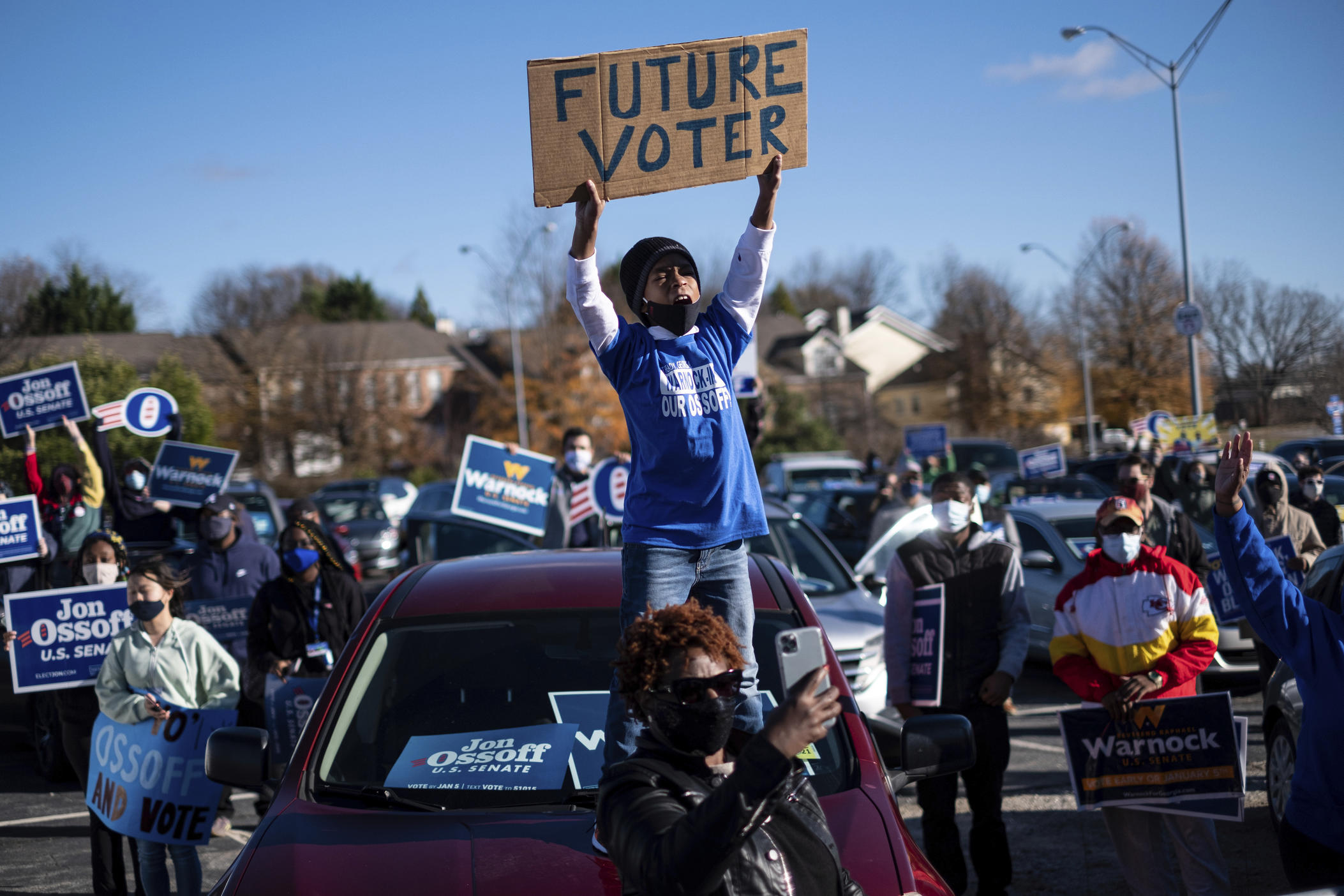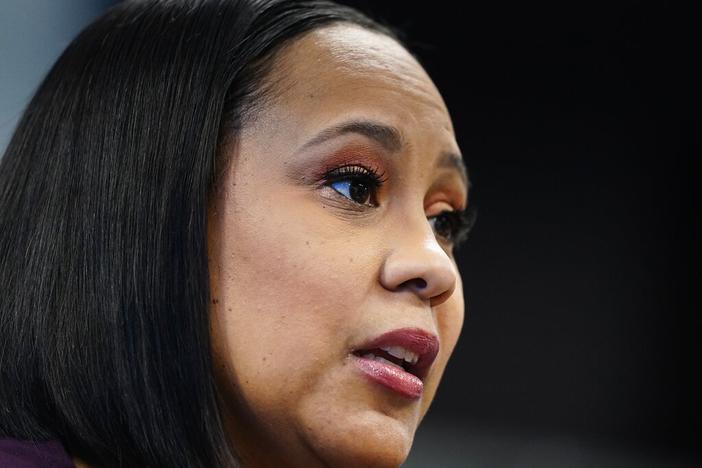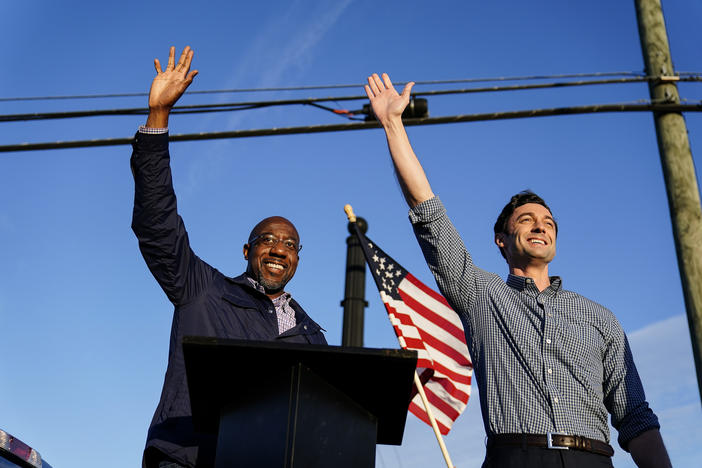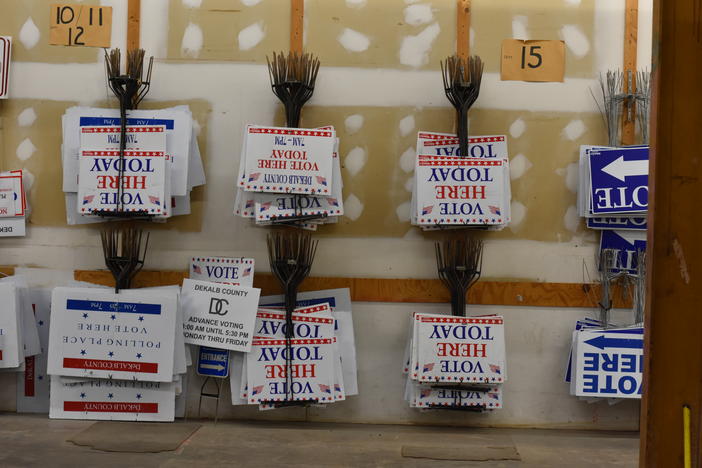Section Branding
Header Content
Georgia Today: Democrat Wins In Georgia Prompt Likely Voting Restrictions
Primary Content
After record election turnout that led to big Democratic wins in Georgia, Republican lawmakers are now pushing legislation that would restrict voter access. On Georgia Today, GPB producer Rahul Bali explains how elections could look the next time Georgians head to the polls.
RELATED: 'Georgia House Passes Elections Bill That Would Limit Absentee And Early Voting'
TRANSCRIPT:
Steve Fennessy: This is Georgia Today. I’m Steve Fennessy. It’s Friday, March 5, 2021. In the wake of Democratic wins in Georgia in the 2020 election — and especially with Donald Trump losing the state to Joe Biden — Georgia Republicans want to change the way we vote. Earlier this week, the Georgia House passed a measure that would cut back on absentee and early voting. Here’s Republican State Rep. Alan Powell arguing in favor of House Bill 531 on the House floor.
Alan Powell: Let me tell you something. Our system has been broke, but it was even more broke this year, not so much because of who won or who lost, but it was broke because, bless its heart, the voter suppression idea went right out the door.
Steve Fennessy: But Democrats and voting rights groups say scaling back on weekend early voting hours will just make it harder for some Georgians to cast ballots, especially Black voters.
Protesters: Vote no on HB 531! Vote no on HB 531!
Steve Fennessy: As lawmakers debated the bill inside the Gold Dome, outside, protesters gathered to make their voices heard.
Protesters: Vote no on HB 531! Vote no on HB 531!
Steve Fennessy: The debate over the proposal became heated. Here's Democratic State Rep. Jasmine Clark.
Jasmine Clark: The numbers are clear. HB 531 is textbook voter suppression. This bill reduces, restricts and limits every single aspect of our elections.
Steve Fennessy: So let's dig deeper into what this proposal could mean for voters across the state. I'm joined by Rahul Bali, a producer for GPB’s Lawmakers.
Steve Fennessy: Rahul, before we talk about the ways in which voting could change in Georgia, it seems like we first need to talk about the 2020 election specifically because we had something like 1.8 million more people vote in 2020 than — than had voted in the 2016 presidential election. And so by any standard of participatory democracy, that's an astounding thing. You know, the idea of a bill is to address a problem that exists. What fundamental problem are they — are they saying they need to address?
Rahul Bali: Confidence in the system. People can argue about where that question of confidence comes from. There were some challenges that came out of changes that were made in relation to COVID. The biggest thing is what you saw with absentee ballots using so much more absentee voting than has ever been used before. And that did tax the system in some ways, especially when you're talking about elections offices, local elections offices, especially small offices in rural Georgia, suddenly having to deal with this wave of absentee ballots that they just have had never really dealt with before. So there were some actual issues that they were dealing with, whether it was the number of ballots or, you know, the current deadline being the Friday before the Tuesday in an election, you don't expect people to be putting in applications that late, but people were. And so that was a challenge. So there were challenges. But a lot of what we're hearing at the state capitol is addressing other issues that are either perceived or — or people were saying were happening that may not have been happening. The first issue that Republicans are raising are the actual drop boxes, and their argument is those are not secure.
Steve Fennessy: Were there any incidents where drop boxes around the state of Georgia were damaged or compromised in any way? Do we know that?
Rahul Bali: Not that I know of. No, I do not. I think the only question that was raised was in some of the smaller counties, there was not like, you know, like in Baldwin County, Georgia, they had a camera pointed at it. But some of the even the smaller counties didn't have a camera 24/7, kind of pointed at the box. That was probably the only security issue that we had heard raised. And — and many of those counties had done that by the time the runoff came around. The other thing that you're hearing is uniformity across across counties.
Steve Fennessy: Meaning in some counties they would opt for Sunday voting. In other counties they would not. And that's confusing?
Rahul Bali: That's the argument that's being made by Republicans, yes. You had counties like Gwinnett and DeKalb, some of these urban counties handling early voting differently from rural counties who — they did just the one day of weekend voting.
Steve Fennessy: Uniformity among the counties. But again, this is not something that's ever really existed. Right? I mean, I've lived here a long time and, you know, counties like Fulton are always slow in turning out election results. But it seems like in this past election cycle that was used as fodder for conspiracies, that somehow they were tinkering with the count.
Rahul Bali: Absolutely. For those of us who’ve covered elections here in Georgia for a long time, whether you're in Atlanta or not, you always know the big cities come in later.
Steve Fennessy: I'm curious when you talk to Georgia elected officials who are now, specifically Republicans, who are considering changing the way we vote. How many of them honestly, truly believe that the election was stolen?
Rahul Bali: There are a couple. There are a handful that I've talked to that when you're away from a microphone, they'll tell you they feel like the election was stolen. And when you ask them, "What happened to your race?" their response was, "Well, it didn't affect my race." It was what was going on in Fulton County and what was going on in DeKalb County. That's where, you know, the votes were stolen. And yes, and they'll tell you that confidence gap was caused by the former president and what he said and what his supporters said.
Steve Fennessy: But shouldn't they be addressing the misperception? I mean, if a bunch of people say the Earth is flat, I shouldn't be out making an effort to actually flatten the Earth. I should actually show them that the Earth is, in fact, round. I'm just curious, what's the best way to address someone who believes in something that is demonstrably untrue?
Rahul Bali: There are two points of view on that. You have some Republicans say we need to directly address what did and didn't happen in the elections. During Monday's debate on House Bill 531, one of the people speaking on behalf of the bill was Speaker Pro Tem Jan Jones.
Jan Jones: As the Georgia General Assembly, our goals in regulating elections should be to assure voting is fair, accessible, understandable, convenient and trustworthy. Georgia elections can be made even more so with the reforms contained in House Bill 531.
Steve Fennessy: And, you know, Rahul, she says she wants to make voting fair, accessible, understandable, convenient and trustworthy. But Democrats would say that's exactly what the system gives us right now.
Rahul Bali: And that's what you've heard from both Democrats, but they've also heard it from Georgia's Secretary of State and they've even heard it from the governor. So, you know, this again, I think goes back to the point of Republicans trying to address constituents who feel like something happened during the November elections. One of the voices we heard during Monday's debate on House Bill 531 was — was Democratic State Rep. Al Williams. He's one of the older representatives. He's seen a lot. And he was one of the people who spoke in opposition to the bill.
Al Williams: And I've been here long enough to know that what Al Williams says today is not going to change a lot of votes. But I do know this. I've lived enough change to know when I see it. I don't have to talk about what history says because of the 17 times I went to jail, 15 of them were protesting and trying to get the right to vote.
Rahul Bali: Rep. Williams talked about that kind of on a personal level during his speech on Monday.
Al Williams: Another thing for sure, in this place called change, God knows I've seen it. I've lived long enough to drink out of a colored water fountain in the Liberty County courthouse, to have watched a Black man sworn in for president of these United States. I've lived the change.
Rahul Bali: I think an important point that needs to be made is the law of unintended consequences and the idea that if you tinker with other parts of the system, you may affect Democratic voters, but you may also affect Republican voters, especially older Republican voters who like to vote absentee.
Steve Fennessy: Rahul, I know that there is an expression "souls to the polls," which was targeted primarily at Black voters to encourage them to vote on those weekends. And having that option taken away is one of the reasons that Democrats are saying that these measures are targeting specifically Democratic voters.
Rahul Bali: Absolutely. And, you know, my in-laws actually live in Gwinnett County where they do weekend voting. And when we visited them, we — we went to two different places. And you absolutely saw voters of color. But not only African American voters who who were, you know, coming from church, they you could tell they were wearing their Sunday best coming to vote. But you also saw a significant Asian population in Gwinnett County that was also voting at two of the locations that I saw. So you're taking away weekend early voting. Are you taking away the number of days you can do it. And that's going to affect Democratic voters of color, whether they're coming from church, coming from the temple or those are just the days that they're going to be able to vote.
Steve Fennessy: How could elections look different the next time Georgians head to the polls? That's ahead. This is Georgia Today.
[BREAK]
Steve Fennessy: It's Georgia Today; I'm Steve Fennessy. Today, we're talking about a new Republican-backed effort to restrict voting access in Georgia. This comes after many in the state GOP insisted that President Trump had won Georgia, even though, of course, we know he lost. Among them was Republican congressman Buddy Carter, who signed on to a lawsuit seeking to overturn the election in favor of Trump. But he recently told NPR he now accepts that President Joe Biden was the winner in Georgia.
Buddy Carter: And I have been very clear and concise on that. President Biden was the victor in the state of Georgia. There's no question about it in my mind, anyway. I know that there are those who the question that. I am not one of those. I don't believe there was voter fraud.
Steve Fennessy: Nevertheless, Carter says he still supports changes to Georgia's election laws. He says it's important for his constituents to have confidence in the voting system.
Buddy Carter: I do know that there are a number of Republicans who are very concerned. I had a meeting this morning with one of my strongest supporters and longtime supporter, and that that person was very concerned about the future and very concerned about the future of our party, but of the future of our country. And that's why — what the legislature, what the Georgia state legislature is doing right now is extremely, extremely important.
Steve Fennessy: So how could the proposals change the way we vote next time? For more, I'm joined by GPB producer Rahul Bali.
Rahul Bali: I think the biggest changes that are going to be coming are going to deal with absentee ballots. That's where things are going to change. I think the first thing, if you asked for an absentee ballot online, that process is not going to change. If you asked for an absentee ballot on paper, that is going to change. You're going to have to put some sort of copy of your photo ID in that. Some of the other changes that I can see coming with absentee ballot is — is the app when you can turn in the application. Right now, it's the Friday before the Tuesday. Local elections officials said that was just flatly impossible, to get an absentee application on a Friday and then somehow turn around and send it out the same day and then expect it to be sent back to them by Tuesday or even just dropped off by Tuesday. Just, they felt like that was impossible. I expect that deadline to go back probably a week to the second Friday before the election, not the Friday before the election, but a week earlier. So that's something else that that you can expect to change. Now, some of the other legislation that could change? It's a gray area whether they're going to get through or not — who can vote absentee.
Steve Fennessy: Because we are a no-excuse state right now.
Rahul Bali: Correct.
Steve Fennessy: That means anybody who wants to vote absentee can. Right?
Rahul Bali: Correct. That's that's something that dates back to legislation that was passed in ‘05 and I believe kicked in for the ‘06 election cycle. So, yeah. And there there are people who have used no-excuse for a long time. I'm one of them. The big roadblock to ending no-excuse absentee balloting is the House speaker.
Steve Fennessy: David Ralston.
Rahul Bali: David Ralston, you know, when he was asked, "Hey, do you want to end no-excuse absentee balloting?" he said "No, unless someone really makes a big argument." And it's very hard for legislation to get through if the speaker says he's not going to make that, allow that to go through.
Steve Fennessy: Help me understand a little bit more about how it would change with with the ID component for an absentee ballot. Assuming that we remain a no-excuse absentee balloting state, what would — what would I need to do if I wanted to vote absentee, in terms of providing some sort of identification, that was different from 2020?
Rahul Bali: What would change is if you get a paper application, that's what would change. So you would fill out that application with your information and you would have to add a copy of a driver's license or this free ID that's being proposed by House Speaker Ralston in the legislature. And they're going to try to do it administratively through the Department of Driver Services. Free IDs that can be used for voting, that can be used to get on an airplane, that can be used to open a checking account. They look like driver's license. That these IDs would be able — these are the ones you could make a copy of and send in with your paper ballot application or your passport or some sort of other application to check. Then comes in the question of what's going to happen with signature verification. Some of the bills are saying once you add the photo ID component, you get rid of signature verification with the paper application. That's what we're trying to figure out, is if you move one piece, what happens with the other piece? Signature verification when you actually vote with an absentee ballot and send it back in, there’s still going to be signature verification with most proposals that are out there. I think absentee ballot application deadline being moved to a week earlier, not the Friday before the election, but two Fridays before, that's going to happen. Processing absentee ballots where when Election Day rolls around outside of maybe absentee ballots that came in on Monday and then on Election Day, all the other absentee ballots have been processed and they've been actually put in the machine — not tabulated, but actually put in the machine. I see that happening.
Now, then there's kind of a second tier of what I think could happen. Could there be changes to auto voter registration? Yeah. Are there going to be changes to early voting on weekends? Changing who can and can't vote absentee?
Steve Fennessy: Two Democrats won the United States Senate in Georgia. The first that the Democratic presidential candidate Joe Biden won, it was the first time since 1992 that a Democratic presidential candidate took Georgia. Would we be having this discussion if things had gone the opposite way?
Rahul Bali: If you also include President Trump losing Georgia, no. It really was the loss of Trump that was the big thing, but losing the two Senate seats was — was also kind of an impetus to a lot of what we're seeing. As much as everyone talks about how big the numbers were for November, the numbers for the January runoff were mind-blowing. You know, some of the counties that that that I cover in rural Georgia, they had more than 90% of their voters come back, which is which is so incredibly unprecedented because some of those are significantly smaller. Those numbers were just incredible. And I think the Senate runoffs were probably another key impetus and key to, you know, seeing those numbers of people voting.
Steve Fennessy: So the outcome was such that it's important to tinker with the architecture of how we vote in order to make it easier for Republicans to win? That's what Democrats are saying, right?
Rahul Bali: Definitely changing weekend voting is going to affect Democratic voters. I don't think that's — I think that that's a fair point to be made.
Steve Fennessy: What are the political forces at play here? We have a Senate seat that's up again in 2022 when Raphael Warnock's seat will be up. And, of course, everybody in the state legislature is up for reelection in 2022. So how important is it that this — the changes be made?
Rahul Bali: I think for Republicans, the key is to change the multiple narratives that they're dealing with. First of all, the narrative among their constituents that believe something happened in the election. You know, despite the lack of evidence, President Trump is leading the state of Georgia on Tuesday night and not — not leading on Wednesday morning. Well, that — that happens because the votes of urban Democratic counties come in later. That has been the way it has been for many, many years. So it's Republicans either showing whether it's passing legislation saying, “Look, OK, we fixed it, now we can move on.”
But there's also the narrative that Republicans are going to have to deal with that they're making it harder to vote. So, on the Democratic side, kind of the key narrative, the kind of key discussion is they don't have enough votes or the power to stop most things that are coming through the legislature. And so, you know, the Democrats’ kind of key narrative is going to be, “Look what Republicans are doing to voting in Georgia” and then there are other avenues going to be through the courts or possibly even through the Biden administration. The key things that they're bringing up is how weekend voting, early voting is handled and the limits on absentee ballots and absentee ballot drop boxes.
Steve Fennessy: As we're discussing all this, in D.C., Congress is talking about also getting in on the act of how states conduct elections. What impact could any of that have on what we're talking about here in Georgia?
Rahul Bali: I think the bigger and more important role that will come from Washington is what the DOJ does and specifically a Biden administration DOJ and what they would do. Now, they don't have some of the same powers that they had in previous cycles, you know, because of court decisions. But the DOJ can still do stuff through — through the Biden administration's Department of Justice. I think the first signs that we're going to get, what the Department of Justice is going to do is — is actually redistricting more so than the election laws, because some of those election laws may not kick in until January the 1st or they may kick in July the 1st.
Steve Fennessy: What do you see the 2022 election shaping up to look like and in the wake of all this?
Rahul Bali: So the first important thing that's going to happen before the 2022 elections is redistricting, where we redraw congressional lines and redraw state House and state Senate seats. The Republican Party has been losing votes in the suburban areas and has been focusing on rural areas. Some rural counties that were won by Nathan Deal by 60% were won by Brian Kemp by 70%. But here's what happened. When those lines are going to get redrawn, very clearly there are going to be some rural districts that are going to flatly disappear and become suburban and urban seats. You have a Republican Party that is becoming increasingly rural and trying to figure out how to still win some votes in the suburban areas, battling a Democratic Party that's — that’s strongly urban and is gaining in suburban areas, gaining in suburban areas, for example, like Cobb County, like Gwinnett County. That's kind of the big picture with 2022 is — is how close is how what happens with the legislature, what happens with the congressional seats? And then, of course, what happens with governor and then with the U.S. Senate seat when — when Raphael Warnock has to run again?
There's only a certain number of votes in rural Georgia that you can win. There's even if you win 70, 80 percent of those votes, the raw numbers are small. And, you know, that's the reason you see the concern within the Republican Party of losing seats in Gwinnett and losing seats in Cobb. So that's — that's the concern there. That's — that's what kind of down the road Republicans are looking at, and down the road, Democrats are looking at. Seeing what the Biden Department of Justice does when the state of Georgia redraws its — its political lines, along with what it does with — with election legislation, it’s going to be very interesting.
Steve Fennessy: For years, for decades even, Georgia, along with other states in the South, were subject to getting federal approval when they tinkered with how they conduct elections because of the legacy of of Jim Crow. And then in 2013, the United States Supreme Court said that that preclearance, as it's called, is unconstitutional. Despite that, is there a chance that there could be some sort of court arguments filed by Democrats, depending on — on what measures might actually go through?
Rahul Bali: Oh, I don't think there's any doubt that there's going to be court action on something, on anything that gets passed. Whether it is voting attorneys, the ACLU, the NAACP, Fair Fight — somebody is going to sue and take some of these things to court.
Steve Fennessy: My thanks to Rahul Bali. He's a producer for GPB's Lawmakers. Georgia is actually one of more than 40 states now considering bills that would make it harder to vote. Myrna Perez is with the voting rights team at the Brennan Center for Justice.
Myrna Perez: In a very discernible and disturbing pattern, we see many of the bills restricting mail voting and they do it in different ways. We've seen bills that would introduce witness requirements, limit the use of drop boxes …
Steve Fennessy: Perez told NPR that efforts to limit voter access are expressly targeting communities of color.
Myrna Perez: There was very little attempt to hide the racialized nature. I mean, where did we hear that there was impropriety happening? In very diverse cities: in places like Detroit, places like Atlanta.
Steve Fennessy: There are just 13 days left in Georgia's legislative session. We'll be following all the developments at GPB.org. I'm Steve Fennessy. This is Georgia Today, a production of Georgia Public Broadcasting. You can subscribe to our show anywhere you get podcasts. Please leave us a rating and review on Apple. Our producers are Jess Mador and Sean Powers. Thanks for listening. We'll see you next week.
Transcript by Khari J. Sampson







